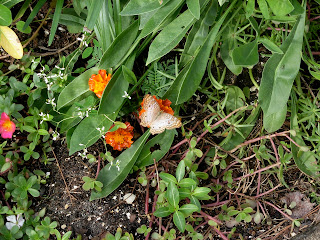iMac Attacks, (i)Twitches,
and (i) Need a Jump
 |
| A tangled mess, just like the last three weeks |
“Septuplets.”
I almost sent that as a text message to a friend on Friday. I rarely cry in
frustration, but a week earlier, sobbing semi-hysterically, I called her after several days of
iMac attacks when the spinning rainbow of doom arrived on my iMac’s monitor and
decided it was there to stay. At first, I thought “No problem, AppleCare to the
rescue.” An hour-long phone call ended with a drive to the Apple Store Genius
Bar 80+ miles south. The spinning rainbow of doom continued to appear throughout
the next week. After more support calls and another trip south, we had a
diagnosis: Surgery was necessary to replace the hard drive. I had my backup
MacBook and transferred a few folders, so I figured I could still work.
During
those down days, I sent frantic e-mails to editor after editor with updates on
my inability to meet deadlines. My aging laptop limped along until one morning
the slightest touch resulted in horizontal lines covering the screen. The MacBook
diagnosis was bleak: $300 to fix the screen. The laptop’s AppleCare expired
years ago, and I didn’t want to spend that much, so I employed a little trick
of tapping lightly on the edge to get the picture to reappear.
Hobbled,
but not completely lame, I attached a mouse and keyboard to the USB ports so I
didn’t have to even touch the laptop. I put it to sleep every hour because of
its tendency to overheat and my fear that it, too, would crash and burn. Deadlines
were further compromised.
In
addition to editing, I recently started a new job submitting grant applications
for a company that produces continuing medical education programs. The field is
foreign to me, and the learning curve is steep. I neglected to transfer most of
my CME-related files to my laptop, which put me at even more of a disadvantage.
File
frustration, horizontal screen lines, missed deadlines, lack of sleep, trying
to learn a new job, and a snippy comment from an associate resulted in tears of
frustration and the emotional meltdown when I called my friend.
We
talked about how sometimes everything seems to go wrong or break all at once. I
remembered that a few months after my separation, when the kids and I felt so
broken, everything else started breaking—appliances, the car, a huge hunk of
wood propped up one of the cabinets to keep it from crashing to the floor. As
we talked, I recalled a quote by one of my favorite authors, Anne Lamott. In a
story that reflects the title of her book, Traveling
Mercies, she relates that some Buddhists believe that when several things
start to go wrong at the same time—to break—it’s “to protect something big and
lovely that is trying to get itself born and that this something needs for you
to be distracted so that it can be born as perfectly as possible.”[i]
Wiping
the tears and snot off my face, I had a new sense of anticipation about
whatever this wonderful thing trying to get itself born would be. I stopped
work for the morning and restored my psyche with a walk on the beach.
Days later, when I finally got the hard drive-replaced iMac home, the first thing I did was restore the
wrong backup from two years ago. During a two-hour AppleCare call, I removed
that backup and restored the correct backup. After more than two weeks,
I could work on my iMac. Over the next several days, I tackled overdue
projects. I still struggled with the grant applications, but pushed ahead. Tuesday,
I hit another wall. I had to sign on to a Web site that can be accessed only
with an upgraded version of Internet Explorer. Few versions of IE and certainly
no current ones work on a Mac. I decided I would use my sister’s Windows laptop
when I went to her house the next day.
Not
so fast. Her laptop also needed the latest version of IE. I know enough about
PCs to download and install a browser update. But no; this update could not be
downloaded because the PC needed an updated OS. I gave up and instead helped my
daughter Zen her new apartment. Ignoring the twitch that had developed in my
left eye, I resigned myself to using a library computer the next day.
I
had avoided the library’s Windows computers for a few reasons: I owed a
whopping fine that I would first have to pay. The library computer’s time limit
might not be enough to complete an application. There is no space for all my
work stuff. When I need help, I cannot use my cell phone to call for
assistance. And I don’t really know
how to operate a PC.
Friday
morning found me at the library, silent cell phone, checkbook, thumb drive, and
files in hand. Ignoring the dirty hamper odor emanating from several patrons, I
sat at the computer, figured out how to insert the thumb drive, got my files
open, and browsed to the Web site, login name and password ready. Ten minutes
later, I learned that no applications were being accepted in the area of
medicine for which I was applying.
I
sighed with relief, got help removing my thumb drive, and thought to myself:
“Now I can get on with my other work and maybe accomplish something.” I felt almost
perky as I sauntered outside to the car where my son was listening to the radio.
He was surprised to see me because I was gone only 40 minutes, rather than an
hour or longer. I sat down, buckled my seatbelt, and turned the key—click,
click, click, click, click.
The
car lights go on with the key, which was on for the radio, so the battery was
dead.
“It’s
okay, Mom, it’s okay Mom,” he said. Aware of my recent trials and fragile
psyche, he knew I was teetering on the edge. He was right. I pulled the hood
lever, got out of the car, and snatched the jumper cables from the trunk. “Find
someone to give us a jump,” I ordered. I opened the hood, got grease on my
hands, but only a few smears on my white blouse. I grabbed my cell phone, ready
to text “Septuplets”—only septuplets could be this much trouble getting born.
Before I could type, a pick-up truck pulled next to my car, but the cables didn’t
reach. My son pushed the car backward (into a handicapped spot), the pick-up
nosed in front of the car, we attached the cables, jumped the car, drove for 20
minutes to charge the battery, and then we headed home. I was productive for
the balance of the workday, probably because I decided that whatever came next,
I was simply going to laugh, even if it would have a rather maniacal tone.
I
never sent the “septuplets” text, but continued to ponder what is trying to get
born in my life, even though I think I figured it out early Thursday
morning—right after I knew I couldn’t expect my sister to upgrade her OS, so I
could update her IE browser, so I could finally get on that Website, so I could
finally do some work about which I was not particularly thrilled.
This
essay is long enough, but when I stepped away from my sister’s computer
Thursday morning, I got a tiny glimpse of what is trying to get born in my life.
Now I just have to distract myself for a few more weeks, so it can arrive as
“perfectly as possible.”
I
am pretty certain it isn’t septuplets.
[i] Lamott, Anne. Traveling Mercies. New York: Pantheon Books, 1999. Print.





























